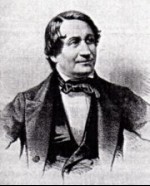| Cesare PugniComposerCesare Pugni (31 May 1802, Genoa, Italy — 26 January 1870, St. Petersburg, Russia) was an Italian composer of ballet music, and, in his early career, composer of Bel canto opera, symphonies, and various other forms of orchestral music. He is most noted for the ballets he scored while serving as Ballet Composer to Her Majesty‘s Theatre in London, and First Imperial Ballet Composer to the Romanov‘s Imperial Ballet in St. Petersburg. Pugni is the most prolific composer of the genre of ballet music that has ever lived - by the end of his life he had scored 312 original ballets, myriad incidental dances, such as divertissements, variations; he also adapted and revised ballet scores by other composers. Of his original ballets, Pugni best-known for Ondine (a.k.a. The Naiad and the Fisherman) (1843); La Esmeralda (1844); The Pharaoh‘s Daughter (1862); and The Little Humpbacked Horse (a.k.a. The Tsar Maiden) (1864). Of his incidental dances, etc. he is most noted for the Pas de Six from La Vivandiиre (a.k.a. Markitenka) (1844); the Pas de Quatre (1845); the Satanella Pas de Deux (a.k.a. the Carnival in Venice Pas de Deux or The Fascination Pas de Deux from Satanella) (1859); and his additional music for Le Corsaire (c. 1856, 1863). Pugni‘s works were written for the most influential choreographers of the 19th century from Milan, to Paris, Berlin, London, and finally St. Petersburg, among them - Jules Perrot, Arthur Saint-Lйon, Paul Taglioni, and Marius Petipa. Nearly every great Ballerina of the Romantic era, from Marie Taglioni to Fanny Cerrito, Lucile Grahn, Fanny Elssler, Carlotta Grisi, and Carolina Rosati, danced the majority of their legendary triumphs in ballets set to his music. During his early career, mostly while in Milan, he also scored five well-received Bel canto operas, over forty masses, 4 (known) symphonies, and many other orchestral pieces, the majority of which were written for small ensembles such as string quartets. - | |
 Mariinsky Theatre:
Mariinsky Theatre:  Mariinsky-2 (New Theatre):
Mariinsky-2 (New Theatre):  Mariinsky Concert Hall:
Mariinsky Concert Hall: 

